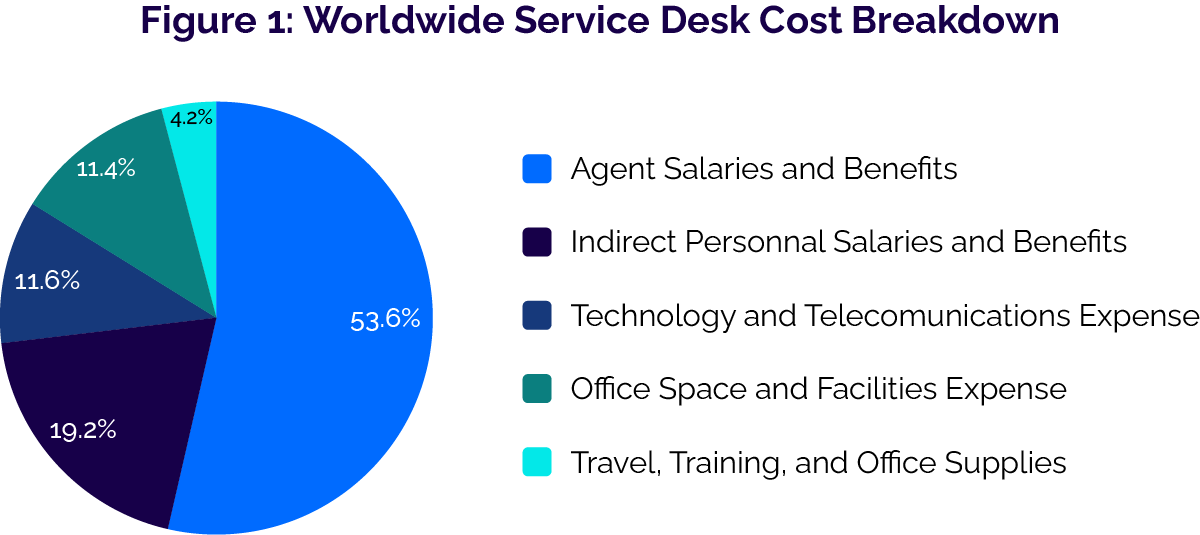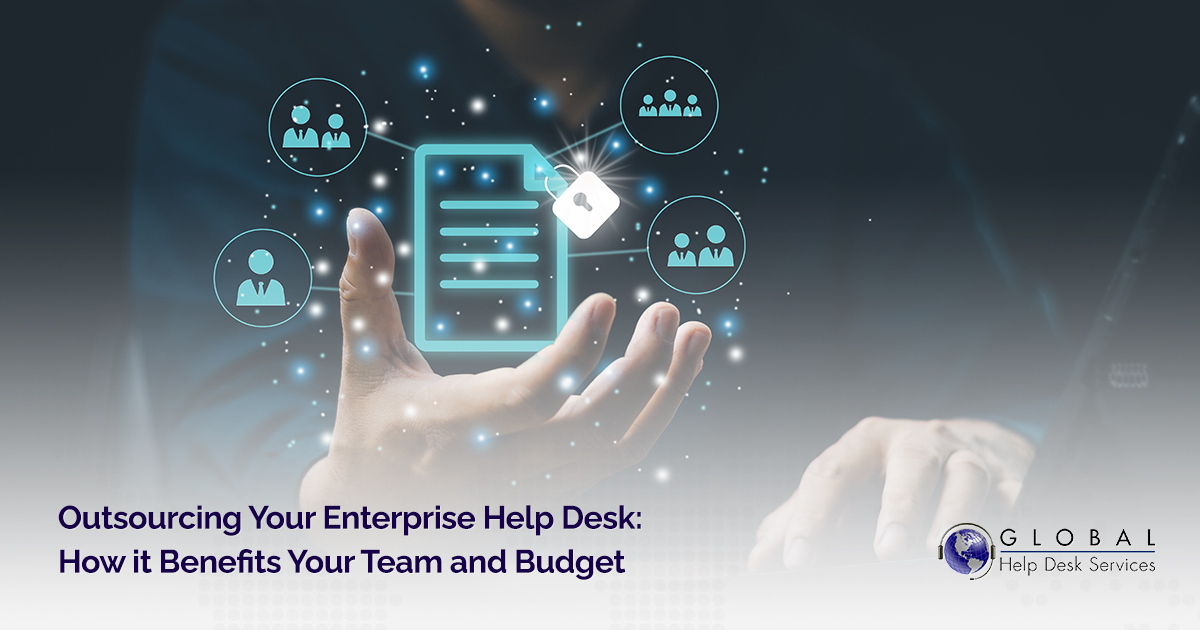Enterprise organizations face plenty of challenges when it comes to operating their IT help desks, like shrinking budgets, limited resources, increased competition, poor customer experience and decreasing customer satisfaction, to name a few.
These challenges are forcing organizational leaders to look at outsourcing all (or part) of their help desks as a solution … and as it turns out, they’re enjoying benefits that ripple well beyond the help desk itself.
A Quick Word About When and What to Outsource
Before we dive into the benefits of help desk outsourcing for enterprise organizations, it’s important to note that help desk outsourcing is rarely an all-or-nothing proposition at this level. Indeed, the larger the organization, the more likely they are to utilize outsourcing. Here’s what that can look like.
How Enterprises Outsource Their Help Desk
Outsourcing an entire help desk is sometimes fluid and may involve the following:
- Enterprises outsource to temporarily increase levels of coverage (for a seasonal peak or for a project, for instance).
- The enterprise may outsource Tier 1 support and keep the internal application support in-house.
- They may outsource the more specialized support that’s increasingly difficult to hire for, keeping lower-tier or more generalized support in-house.
- Some enterprises like to operate their own help desk during core hours while outsourcing to a third-party provider for evenings, overnights, weekends and holidays. Or they hire an outsourced help desk for their core hours but keep an operations group behind the scenes to answer service calls during off hours.
Here are some common scenarios showing how that can play out in real life:
- You have a small internal network support team, and you outsource network monitoring, circuit provisioning and maintenance.
- You have an internal desktop support team, and you use a managed service provider or per diem contractors to visit your remote sites.
- You develop your applications in-house but outsource application support to a third-party help desk vendor.
The possibilities are practically endless, but your help desk vendor must work closely with your team to understand the full scope of your needs and then offer a customized solution that fits. By doing so, your organization can reap all the benefits.
And they can be transformative.
Benefit No. 1: Help Desk Outsourcing Ensures Predictable Costs
Outsourcing can reduce (or eliminate) the need for real estate, equipment, hiring, training, and management of your own help desk staff.

Source: https://www.thinkhdi.com/library/supportworld/2021/understanding-cost-per-ticket.aspx
With an outsourced help desk team, everything is consistent and transparent, which makes budgeting much easier: Being able to predict your costs means you support your growth strategies without worrying about surprises that come about because of being inefficient.
The level of predictability you enjoy depends on the pricing model you have with your outsourced help desk. Some enterprises pay for a baseline volume of support tickets, with charges for overages. Other enterprises pay for a larger baseline volume of tickets, which they must grow into before they ever incur any extra costs. When they get close to going over their baseline, they either re-baseline or re-budget.
With these pricing models, businesses are much more able to predict their costs, which leads to improved forecasting and, in the end, a better use of resources.
Benefit No. 2: Help Desk Outsourcing Helps You Focus on Business-Critical Tasks
Businesses simply don’t make it to enterprise level without knowing what jobs should be delegated to outside experts.
Outsourced help desks help you free up higher-level resources to work on business-critical tasks, increasing your capacity without increasing costs.
For example, if you eliminate 33% of the support requests going to Tier 3 by outsourcing, that's potentially 33% more time your Tier 3 staff has for key objectives like new implementations, improving your applications and infrastructure, or even supporting the development of a new service or product that will drive revenue and growth. We say potentially 33% because there are other variables such as the amount of time it takes your Tier 3 staff to resolve support requests that will impact the amount of capacity you are able to recoup.
How? Well, if each of your Tier 3 support staff is only able to handle approximately 12 tickets per day and they spend 30 minutes on each ticket, then you’ll only gain back 2 hours or 25% working hours per technician. A capacity gain of 25% scaled across four technicians is equivalent to one full time employee being available daily.
Any capacity gain you can realize by outsourcing your help desk may finally give you the time and resources to fix the problems that are causing the support calls to begin with.
Benefit No. 3: Help Desk Outsourcing Helps You Adapt Better to Change
Being able to quickly adapt to change translates into consistent efficiency, customer experience, and customer satisfaction. But with growth, acquisitions, rollouts and unexpected interruptions, support volumes change quickly. And that’s before factoring in the wild fluctuations caused by the increase in remote work across many enterprise organizations.
With an internal help desk team, adapting to sudden change means investing in hardware, software, additional staff, and training. And while you’re scrambling to catch up, efficiency will suffer considerably. With an outsourced help desk team, however, you get faster access to increased capacity, proven processes, and all the latest tools and technologies to mitigate the impact to your service delivery.
For example, let’s say you’re switching your mobile device management software or your multi-factor authentication software.
There are only a few key players that enterprises tend to go to. And guess what: The better help desks are already working with them. So, picking one of these software vendors might be new for your enterprise, but it won’t be new to many outsourced help desks, because they’re already supporting these solutions for their other customers. And because of this familiarity, they can offer helpful insight on common ticket requests and how to optimize onboarding and implementation.
So, not only can the right outsourcing help desk partner ease your capacity during times of change, but it can also act as your strategic guide, making that change much smoother for your entire organization.
Benefit No. 4: Help Desk Outsourcing Improves Quality and Reliability
One thing that makes help desk outsourcing so popular is having expert knowledge and skill on call — without paying for extra headcount.
These skilled professionals follow industry best practices and bring a quality standard to bear, with a focus on continuous improvement:
- The best outsourced help desks follow standard operating procedures, troubleshooting steps and other processes that they’ve developed and perfected over time.
- They ensure that their agents are trained in (and follow) the latest best practices.
- Their predictable, repeatable processes deliver reliable services to your users.
- As a bonus, a quality outsourced help desk team helps you set up key performance indicators to ensure you deliver your strategies efficiently and on time.
Outsourcing all or part of your enterprise help desk is a wise move because it delivers a positive ROI. You increase coverage, improve service levels, boost customer satisfaction and more. And if you partner with the right provider, you lower your help desk support costs while also gaining capacity and expertise.
Are you interested in seeing why help desk outsourcing is ideal for your enterprise organization? Read our useful guide: How to Choose an Enterprise Help Desk IT Support Company.


